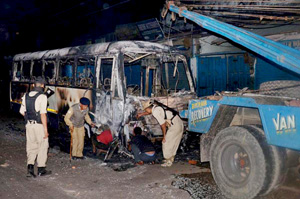Kohima, Mar 8: At least eighteen persons have been arrested in connection with the lynching incident in Dimapur even as protests against the killing continued to rock many parts of the state today.
Police said the arrests were made after going through the mobile video clippi ngs of the incident.
ngs of the incident.
Protests against the lynching were reported from different parts of the state, including Karimganj, and a strict vigil was being maintained to prevent any untoward incident.
The body of rape accused Syed Farid Khan was taken to his home town of Karimganj in Assam yesterday after it was handed over by Nagaland authorities.
Khan had been arrested on charge of raping a woman in Dimapur on February 24 and remanded to judicial custody in the Dimapur Central Jail the next day.
On March 5, a mob broke into the jail, dragged him out, stripped him naked, beat him up, pelted him with stones and dragged him behind a motor cycle with a rope tied around his waist for seven kms towards the centre of Dimapur town when he died from his injuries along the way.
The mob then hung his body at a clock tower.
Meanwhile, The Nagland government has imposed a 48-hour Internet blackout in the state beginning last night after videos related to the lynching of a rape accused in Dimapur surfaced on the net.
The government order blocking Internet for the period was published in the local newspapers today.
The government has also instructed mobile service providers to block SMS/MMS services too, the newspapers said.
Videos related to the lynching have being doing the rounds and the measure has been taken as a precautionary exercise, the government order said.
Meanwhile, prohibitory orders imposed in Dimapur town for the last two days were relaxed in the morning to enable people to attend church services.
Prohibitory orders would be in force from 3 PM till midnight, a police officer said.





Comments
Add new comment